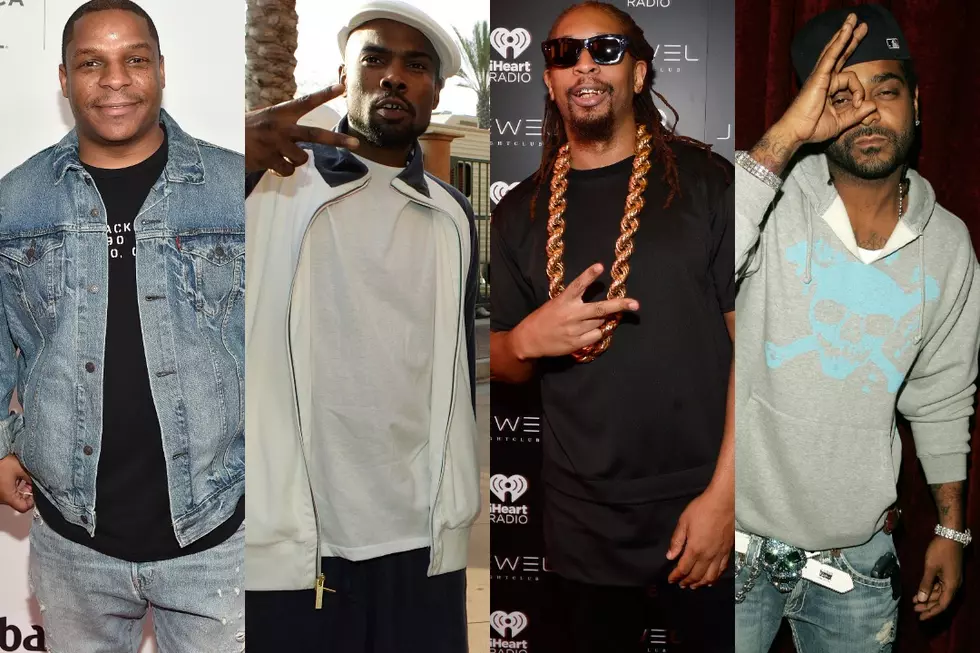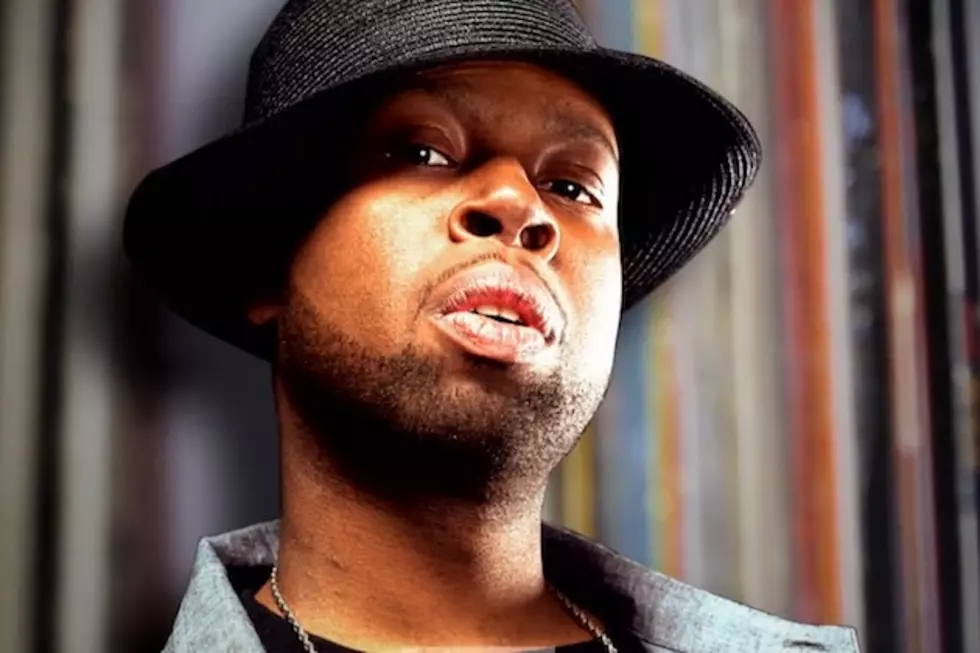
10 Years Later: Proof’s ‘Searching for Jerry Garcia’ Album Is More Prophetic Than You Think
Casual hip-hop fans may be more familiar with deceased rapper Proof from his connection to Eminem, but his legacy is much more than that.
Far from just a confidant to one of the greatest rappers of all-time, Proof was also a master of ceremonies with plenty of rap skills of his own. Proof, born DeShaun Holton on Oct. 2, 1973 in Detroit, was the product of a single family home. His father, a music producer, left the family to pursue his career prior to Proof's birth. But the rapper carried on the music talent even without his dad's presence.
Taking to hip-hop at an early age, Proof would begin writing rhymes and participating in a litany of battles and cyphers, quickly building a reputation as a formidable wordsmith. His love for the art of rhyming would be the conduit for a friendship with a neighborhood kid named Marshall Mathers, who would later gain worldwide fame as Eminem and put Detroit rap back on the map.
During his years at Osborne High, Proof would meet fellow aspiring rapper Mudd. He joined a group Proof had formed with another, Thyme, called 5-Elementz. The trio would gain notoriety around the local circuit, performing at any open mic or showcase, as well as parlaying their respective gigs at fashion designer Maurice Malone's historic Hip Hop Shop, where many artists, including a still-raw Eminem, earned their stripes in a competitive environment. Proof was often at the center of the creative energy that was frequently permeating the shop's Rhythm Kitchen.
With hopes of snagging a record deal, Proof and his fellow group mates made the trek to New York, where he nearly made the championship round of the 1998 Blaze Battle, but lost in what he considered a controversial decision. Proof was also selected to be the subject of Source Magazine's Unsigned Hype in May of 1999, in large part due to his buzzworthy showing during the magazine's Live Tour Battle, of which the charismatic MC was crowned champion after knocking out his competitors with his lyrical punches.
But in the wake of former mentee Eminem's newfound success as the franchise artist of Dr. Dre's Aftermath Entertainment roster, Proof decided to accompany his longtime friend on tour, essentially marking the end of 5-Elementz as constituted and the beginning of D12. A collective of Detroit rap artists that Proof put together that included himself, Eminem, Kuniva, Bizarre, Kon Artist and Swifty McVay, the group would release their 2001 debut, Devil's Night, on Shady/Aftermath. The album would debut at No. 1 on the Billboard 200 chart and would go on to sell more than two million copies stateside and more than four million worldwide.
D12 doubled up on that success with their sophomore album, D12 World, which gave them back to back chart-topping debuts and sold over a half-million copies in its first week of release. But while the numbers were lofty and the life was good, many felt that D12's success was a product of Eminem's involvement. He was instrumental in pushing individual efforts by group members, including the announcement of Proof's plan to unleash his debut solo album. I Miss the Hip Hop Shop arrived in 2004, which features the hilariously titled Ja Rule diss track " Ja in a Bra" and J Dilla and DJ Premier lending their production savvy to the effort. However, it would be his next project that served as his hip-hop bow to the world.
That album, Searching for Jerry Garcia, touched down on Aug. 9, 2005 via Proof's own Iron Fist Records to little fanfare. Unfortunately, the project peaked at No. 65 on the Billboard 200 chart and failed to go gold or platinum compared to his D12 releases. But what Searching for Jerry Garcia lacked in big Soundscan numbers, it more than made up for with its content and execution.
Listen to Proof's "High Rollers" Feat. B-Real & Method Man
He decided to name the album after legendary Grateful Dead frontman Jerry Garcia, whom he felt a certain spiritual and creative kinship with. Proof deliberately released the effort on the 10-year anniversary of the rocker's death. The title should have been an indication that this was not your run-of-the-mill glorified weed-plate, but something much more.
Being one to never forget where he comes from, Proof begins the album where it all started on the album opener, "Knice." The rapper reflects on his journey, expressing that he's yet to find his purpose. This is paired with a recording of him being awarded the Hip-Hop Recognition Award at the inaugural Detroit Hip Hop Awards. Proof then gets into the thick of things with the glorious "Clap With Me," which captures Proof running down his resume over the Emile-produced soundbed.
"Biboa's Theme" is a zany offering that Proof treats as a blank canvas, splashing colorful couplets all over the track, spitting, "After a show, bring all my fans in a bus / Next city, leave dizzy, stranded and stuck / Hanging in clubs like blacks in slavery / Gats we aim and squeeze in acts of bravery" and turning in an lively effort. "Purple Gang," which features Proof teaming up with his Iron Fist proteges of the same name, falls in like with "Biboa's Theme" sonically, but plays as more of an introductory for Purple Gang to get their feet wet. He plays the cut save for his intro verse and lets the young pups run wild over the Black Milk-helmed beat.
After showing love to the young guard, the MC links up with a few veteran spit-kickers in B-Real and Method Man on the standout selection, "High Rollers." Kicking flows over a LTD sample and doing it up for the tokers, all three come equipped with potent bars, with Method Man taking the cake with a rewind-worthy finale verse.
The project isn't without its smoothed-out moments, which is evident by "Pimplikeness," which subtly pays homage to Detroit's reputation for laying down game and embodying finesse alongside his D12 cronies. MC Breed crashes the party on "Ali," with the veteran Michigan pioneer providing monkey bars on the humble end and with efficiency. "Let's get to the source wit mics on our knee, black / 'Cause five mics together only makes feedback / I'm what ever rapper dreads like beeswax / Knock a rapper out his Timbs like stems out weed packs," raps Proof, who maneuvers over the beat with the guile of a seasoned assassin.
Delving further into the heart of Searching for Jerry Garcia and we're greeted by the King Gordy-assisted highlight, "No T. Lose," a DJ Jewels-produced number powered by a booming kick drum and sparse snares, which the two ride over with precision. "Jump Biatch," originally titled "Eric Clapton Jr.," is a guilty pleasure that thinly skirts the line between cruel and entertaining, but is a winner nonetheless.
The last quarter of Searching for Jerry Garcia is heavy on collaborations, with Rude Jude popping up on the rock-inspired head-banger, "M.A.D.," a rebellious ditty for teenagers and young adults who are shameless degenerates. "Sammy Da Bull" features Nate Dogg on the hook and D12 group mate Swifty McVay bringing the pain with a larcenous guest verse. "Slum Elements" features a reunion between Proof and former partner-in-rhyme Mudd on the Mr. Porter produced, "Slum Elements." Slum Village member and fellow Motor City native T3 comes in with an assist as well.
The LP ends on a solemn note with the eerily prophetic closeout track, "Kurt Kobain," which features Proof baring his soul over the heart-wrenching production. He pens a letter ("This my last letter right here / F--- this world, lets get the f--- outta here") before taking his own life. The second verse is especially eerie, with Proof rapping, "Still living wit the liquor and bud / Sometimes I wish for my demise so I could kick it with Bugz" -- the latter is reference to the late D12 member whom Proof would ultimately join on the other side. Proof sends out last words to his family and close friends before a gunshot cuts off the verse.
Searching for Jerry Garcia would be the last body of work the rhymer would gift the world with. He was tragically gunned down during an altercation in a Detroit nightclub, passing away on April 11, 2006 at the age of 32. Hearing a song like "Kurt Kobain" after his death is a reminder of his lyrical talent but also his knack for drawing a listener into the darker aspects of his world. His murder was an unexpected blow to the hip-hop community. The life of one of the most beloved and influential figures in the Detroit's rap scene was gone.
His legacy was unfulfilled. Proof had all the potential in the world to accomplish bigger and better things. Proof's thoughts on "Knice" were not in vain. He certainly touched more friends, family and fans than he got the chance to experience in his short-lived career. Searching for Jerry Garcia may not have garnered platinum plaques and goes overlooked more often than not, but the project remains a great album by a talented MC with a lasting message: "And that's why you've always been friends with Proof / Answer to all, I've always lied with truth."
Listen to Proof's "Kurt Kobain"
See Artists We Lost in 2015 (So Far)
More From TheBoombox


![Kickstarter Campaign Created to Make Documentary on Proof’s Life [TRAILER]](http://townsquare.media/site/625/files/2015/10/proof.jpg?w=980&q=75)






